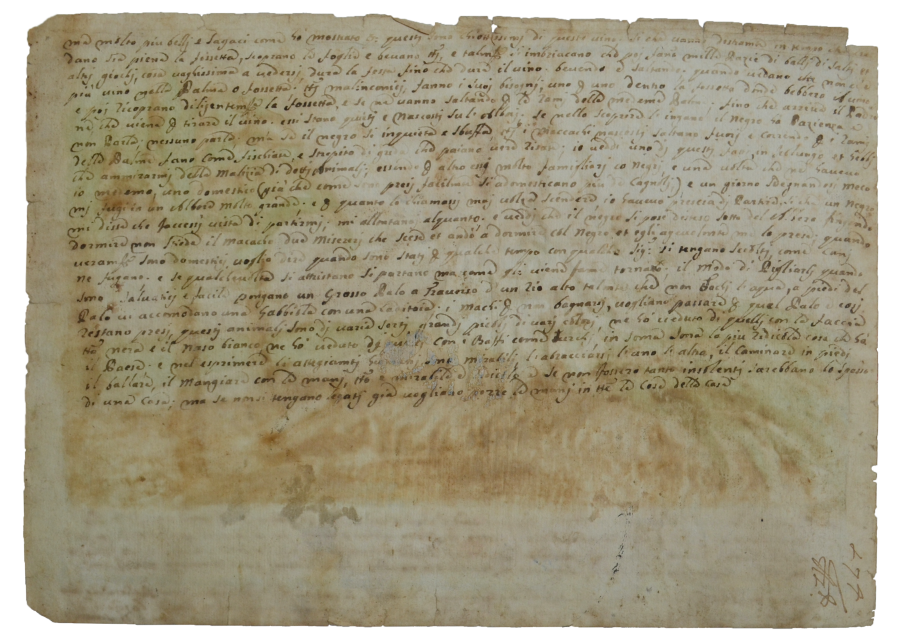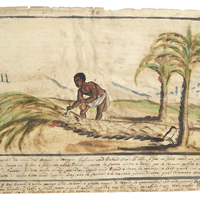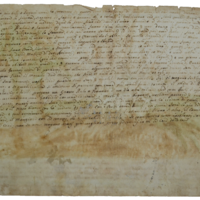PW045: Palm tree that gives wine from October to May
1: Palma che da il vino dal Ottobre al Maggio.1 Tagliano una Palma come si vede, e poi vi fan[n]o come un piccolo Trogoletto lungo un Palmo e fondo un altro Palmo; questo lo fanno vicino a rami; poi lo coprano molto bene con foglie di Banane che sono molto grandi, ponendovi sopra una Pietra o legno, la mattina e sera van[n]o con un chuchiaro fatto di cocco e con una zucca ; scoprano la fossetta e la trovano piena di vino; qual chiamano malaf,2 ma però p[er] noi bianchi è molto nocivo alla salute; e presto empie di rogna. La maraviglia che una pianta Tagliata che loro dicano dirubada habbi e stilli tanto umore anche quando non ha radici, mirabilis deus.3 Non voglio lasciare di dire una cosa ridicolossima et è che essendo piena questa selva di Machachi che e una specie di scimie [verso]
ma molto piu belli e Sagaci come ho mostrato &: questi sono chiottissimi di questo vino; si che vanno destramte in tempo che credono sia piena la fossetta, scoprano la foglia e bevano t[u]tti, e talmente si imbriacano che poi fan[n]o mille Pazie di balli di salti et altri giochi, cosa vaghissima a vedersi, dura la festa fino che dura il vino; bevendo e saltando; quando vedano che non c’é più vino nella Palma o fossetta, tutti malinconici, fanno i suoi bisogni, uno p[er] uno dentro la fossetta donde bebbero il vino e poi ricoprano diligentemente la fossetta, e se ne vanno saltando p[er] le rami della medema Palma; fino che arriva il Padrone, che viene p[er] tirare il vino; essi stano quieti e nascosti su l’Albori; se nello scoprire l’ingano il negro ha Pazienza e non Parla; nessuno parla; ma se il negro si inquieta e sbuffa, t[u]tti i machachi nascosti saltano fuori e corendo p[er] i rami delle Palme, fano [sic] come fischiare e strepito di grida che paiano vere risata; io veddi uno di questi fatti in Icolungo et hebbi che ammirarmi della malizia di detti Animali; essendo p[er] altro essi molto famigliari co negri, e una volta che ne havevo io medemo, uno domestico (già che come sono presi facilmente si adomesticano piu che cagnoli, ) e un giorno sdegnandosi meco mi fugi in un Albore molto grande; e p[er] quanto lo chiamassi mai volga scendere, io havevo prescia di Partire, si che un negro mi disse che facessi vista di partirmi; mi allontanai alquanto; e veddi che il negro si pose disteso sotto del Albero fingindo dormire non stiede il macacho due Misereri4 che scese et andò a dormire col negro et egli agevolemente mi lo prese; quando veramente sono domestici, voglio dire quando soni stati p[er] qualche tempo con qualche Sig:e si tengano sciolti, come cani ne fugano; e se qualche volta si attristano si partano ma come gli viene fome tornano; il modo di Pigliarli quando sono salvatici e facile pongano un grosso Palo a Traverso d’un rio alto talmente che non Tochi l’aqua, a piedi del Palo vi accomodano una Gabbiola con una caditoia; i machi p[er] non bagnarsi, vogliano passare p[er] quel Palo e cosi restano presi; questi animali sono di varie sorti grandi, picoli di vari colori, ne hò veduto di quelli con la faccia t[u]tta nera e il naso bianco, ne hò veduto di quelli con i Baffi come Turchi, in soma soma [sic] la piu ridicola cosa che hà il Paese; e nel esprimere li attegiamti humani sono mirabili, l’abracciarsi l’uno l’altro, il caminare in piedi, il ballare, il mangiare con le mani, t[u]tto e mirabile e ridicole e se non fossero tanto insolenti sarebbano lo spasso di una casa; ma se non si tengono legati gia vogliano porre le mani in t[u]tte le cose della casa.
1: Palm tree that gives wine from October to May. They cut a Palm tree as can be seen, and then they make a little trough one palm long and another palm deep; they make it near the branches; then they cover it very well with Banana leaves which are very large, putting on top a stone or wood, morning and evening they go with a ladle made with a coconut and with a gourd, they uncover the little trench and they find it full of wine which they call malaf5 but it is very bad for the health of us white people; and soon gives scabies; the marvel that a cut plant which they call dirubada6 would have and ooze so much humor even when it does not have roots anymore mirabilis deus.7 I do not want to omit to mention a ridiculous thing and it is that because this forest is full of Macaques which is a type of monkey [verso]
but a lot handsomer and intelligent as I have shown etc. these are very avid of this wine so that they go dexterously at the time that they think the little trough is full, they lift the leaves and drink it all, and they become so inebriated that afterwards they do all sorts of crazy things, dancing, jumping, and other games, which is a very beautiful thing to see, and the party lasts as long as the wine lasts, drinking and leaping; when they see that there is no more wine in the palm tree or the trough, all melancholy, they relieve themselves one by one in the trough from which they drank the wine and then cover the trench again diligently, and they go away jumping through the branches of the same Palm tree; until the owner arrives to collect the wine, they are quiet and hidden in the tree, if in discovering the subterfuge the black has patience and does not speak, no one speaks, but if the black gets upset and grumbles, all the hidden macaques jump out and running over the Palm branches they make kinds of whistles and roars of screams that seem like real laughs; I have seen one of these events, in Icolungo and I had to marvel at the malice of these animals; being these what is more very close to the blacks, and once when I myself had a domesticated one8 (since because they are captured easily they are domesticated more than puppies) and one day scorning me it escaped from me into a very tall tree, and as much as I called it, it never came down, I was in a rush to leave, so that a black told me that I should pretend to go; I went a little ways away; and saw that the black placed himself lying under the tree pretending to sleep the macaque did not stand two miserere that he came down and went to sleep with the black, and he agilely caught it for me; when they are truly domesticated, I mean when they have been for some time with a master they may be kept loose, like dogs they do not run away; and if sometime they are sad they leave but as hunger comes to them they come back; the way to catch them when they are wild is easy. They put a large Pole Across a high stream so that it does not touch the water, and at the foot of the pole they arrange a cage with a trap; the macaques not to get wet want to cross through this stick and thus get captured, these animals are of various sorts, large and small, of various colors, I have seen some with the face all black and the nose white, I have seen some with mustaches like Turks, in sum, [they are] the funniest thing that the Land has, and they are remarkable in in the expression of humans attitudes, the embracing of one another, the walking upright, the dancing, the eating with the hands, it is all remarkable and funny and if they were not so insolent they would be the joy of a house; but if they are not tied up they want to put their hands on everything in the house
- 1Palm wine was harvested from several palm species including the raffia palm Elaeis guineensis.
- 2From Kikongo and Kimbundu, malafu: palm wine. It appears as malaúú in Vocabularium: 95.
- 3Mirabilis deus [in sanctis suis] Psalm 67:36 Latin Vulgate, “God is Wonderful.”
- 4Miserere, or Psalm 51 is the Latin Catholic prayer of repentance, used here as a measure of time.
- 5Sic. From Kikongo and Kimbundu, malafu: palm wine. It appears as malaúú in Vocabularium: 95.
- 6From the Portuguese derrubada: in this case, referring to a tree, felled.
- 7In Latin in the text.
- 8See pet monkey in Dionigi da Piacenza and Michel Angelo da Reggio, Viaggio, 116.




Add new comment